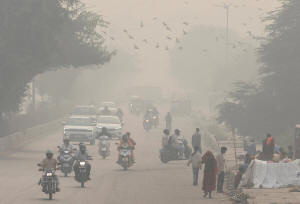|
Air
quality levels in the city were over 320 on the air quality
index, a level categorized as 'hazardous' by Swiss group IQAir,
although it was not as bad as the 400 range hit earlier this
week.
Schools in the capital city would remain closed from Thursday
until Nov. 18 on a winter break, which was originally scheduled
for January, the Delhi government said in a notification.
Primary schools in the city had already been shut, as part of
measures to protect young children against smog and growing air
pollution.
The world's most polluted city, with a population of more than
20 million, has stopped construction activities, imposed
restrictions on use of vehicles from next week, but wants
neighboring states to control crop residue burning.
Farmers in Punjab and Haryana usually burn crop stubble left
behind after rice is harvested in late October or early November
to quickly clear their fields before planting wheat crops.
The practice has been followed for years and the resultant smoke
has typically accounted for 30% to 40% of Delhi's
October-November pollution, according to federal government's
air-quality monitoring agency SAFAR.
On Tuesday, the country's top court ordered states surrounding
New Delhi to stop farmers burning residue.
(Reporting by Shivam Patel, additional reporting by Manoj Kumar,
writing by Shilpa Jamkhandikar; Editing by Raju Gopalakrishnan)
[© 2023 Thomson Reuters. All rights
reserved.] Copyright 2022 Reuters. All rights reserved. This material may not be published,
broadcast, rewritten or redistributed.
Thompson Reuters is solely responsible for this content.

|
|




